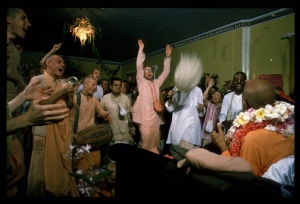CC Madhya 20.147-148 (1975): Difference between revisions
(Vanibot #0027: CCMirror - Mirror CC's 1996 edition to form a basis for 1975) |
(Vanibot #0020: VersionCompareLinker - added a link to the Version Compare feature) |
||
| Line 2: | Line 2: | ||
<div style="float:left">'''[[Sri Caitanya-caritamrta (1975)|Śrī Caitanya-caritāmṛta (1975)]] - [[CC Madhya (1975)|Madhya-līlā]] - [[CC Madhya 20 (1975)|Chapter 20: Lord Śrī Caitanya Mahāprabhu Instructs Sanātana Gosvāmī in the Science of the Absolute Truth]]'''</div> | <div style="float:left">'''[[Sri Caitanya-caritamrta (1975)|Śrī Caitanya-caritāmṛta (1975)]] - [[CC Madhya (1975)|Madhya-līlā]] - [[CC Madhya 20 (1975)|Chapter 20: Lord Śrī Caitanya Mahāprabhu Instructs Sanātana Gosvāmī in the Science of the Absolute Truth]]'''</div> | ||
<div style="float:right">[[File:Go-previous.png|link=CC Madhya 20.146 (1975)|Madhya-līlā 20.146]] '''[[CC Madhya 20.146 (1975)|Madhya-līlā 20.146]] - [[CC Madhya 20.149 (1975)|Madhya-līlā 20.149]]''' [[File:Go-next.png|link=CC Madhya 20.149 (1975)|Madhya-līlā 20.149]]</div> | <div style="float:right">[[File:Go-previous.png|link=CC Madhya 20.146 (1975)|Madhya-līlā 20.146]] '''[[CC Madhya 20.146 (1975)|Madhya-līlā 20.146]] - [[CC Madhya 20.149 (1975)|Madhya-līlā 20.149]]''' [[File:Go-next.png|link=CC Madhya 20.149 (1975)|Madhya-līlā 20.149]]</div> | ||
{{CompareVersions|CC|Madhya 20.147-148|CC 1975|CC 1996}} | |||
{{RandomImage}} | {{RandomImage}} | ||
| Line 12: | Line 13: | ||
:ity asyā hṛdayaṁ loke | :ity asyā hṛdayaṁ loke | ||
:nānyo mad veda kaścana | :nānyo mad veda kaścana | ||
:māṁ vidhatte | |||
:māṁ vidhatte 'bhidhatte māṁ | |||
:vikalpyāpohyate hy aham | :vikalpyāpohyate hy aham | ||
:etāvān sarva-vedārthaḥ | :etāvān sarva-vedārthaḥ | ||
| Line 24: | Line 26: | ||
<div class="synonyms"> | <div class="synonyms"> | ||
kim—what; vidhatte—direct; kim—what; ācaṣṭe—declare; kim—what; anūdya—taking as the object; vikalpayet—may conjecture; iti—thus; asyāḥ—of the Vedic literature; hṛdayam—intention; loke—in this world; na—not; anyaḥ—other; mat—than Me; veda—knows; kaścana—anyone; mām—Me; vidhatte—they ordain; abhidhatte—set forth; mām—Me; vikalpya—speculating; | kim—what; vidhatte—direct; kim—what; ācaṣṭe—declare; kim—what; anūdya—taking as the object; vikalpayet—may conjecture; iti—thus; asyāḥ—of the Vedic literature; hṛdayam—intention; loke—in this world; na—not; anyaḥ—other; mat—than Me; veda—knows; kaścana—anyone; mām—Me; vidhatte—they ordain; abhidhatte—set forth; mām—Me; vikalpya—speculating; aphyate—am fixed; hi—certainly; aham—I; etāvān—of such measures; sarva-veda-arthaḥ—the purport of the Vedas; śabdaḥ—the Vedas; āsthāya—taking shelter of; mām—Me; bhidām—different; māyā—illusory energy; mātram—only; anūdya—saying; ante—at the end; pratiṣidhya—driving away; prasīdati—gets satisfaction. | ||
</div> | </div> | ||
| Line 31: | Line 33: | ||
<div class="translation"> | <div class="translation"> | ||
" 'What is the direction of all Vedic literatures? On whom do they set focus? Who is the purpose of all speculation? Outside of Me no one knows these things. Now you should know that all these activities are aimed at ordaining and setting forth Me. The purpose of Vedic literature is to know Me by different speculations, either by indirect understanding or by dictionary understanding. Everyone is speculating about Me. The essence of all Vedic literatures is to distinguish Me from māyā. By considering the illusory energy, one comes to the platform of understanding Me. In this way one becomes free from speculation about the Vedas and comes to Me as the conclusion. Thus one is satisfied.' | |||
</div> | </div> | ||
==== PURPORT ==== | ==== PURPORT ==== | ||
<div class="purport"> | <div class="purport"> | ||
These two verses are quoted from Śrīmad-Bhāgavatam ( | These two verses are quoted from Śrīmad-Bhāgavatam (11.21.42,43). When Uddhava asked Kṛṣṇa about the purpose of Vedic speculation, the Lord informed him of the process of understanding Vedic literature. The Vedas are composed of karma-kāṇḍa, jñāna-kāṇḍa and upāsanā-kāṇḍa. If one analytically studies the purpose of the Vedas, he understands that by karma-kāṇḍa, sacrificial activity, one comes to the conclusion of jñāna-kāṇḍa, speculative knowledge. After speculation, one comes to the conclusion that worship of the Supreme Personality of Godhead is the ultimate. When one comes to this conclusion, he becomes fully satisfied. | ||
</div> | </div> | ||
Latest revision as of 12:43, 27 January 2020

A.C. Bhaktivedanta Swami Prabhupada
TEXTS 147-148
- kiṁ vidhatte kim ācaṣṭe
- kim anūdya vikalpayet
- ity asyā hṛdayaṁ loke
- nānyo mad veda kaścana
- māṁ vidhatte 'bhidhatte māṁ
- vikalpyāpohyate hy aham
- etāvān sarva-vedārthaḥ
- śabda āsthāya māṁ bhidām
- māyā-mātram anūdyānte
- pratiṣidhya prasīdati
SYNONYMS
kim—what; vidhatte—direct; kim—what; ācaṣṭe—declare; kim—what; anūdya—taking as the object; vikalpayet—may conjecture; iti—thus; asyāḥ—of the Vedic literature; hṛdayam—intention; loke—in this world; na—not; anyaḥ—other; mat—than Me; veda—knows; kaścana—anyone; mām—Me; vidhatte—they ordain; abhidhatte—set forth; mām—Me; vikalpya—speculating; aphyate—am fixed; hi—certainly; aham—I; etāvān—of such measures; sarva-veda-arthaḥ—the purport of the Vedas; śabdaḥ—the Vedas; āsthāya—taking shelter of; mām—Me; bhidām—different; māyā—illusory energy; mātram—only; anūdya—saying; ante—at the end; pratiṣidhya—driving away; prasīdati—gets satisfaction.
TRANSLATION
" 'What is the direction of all Vedic literatures? On whom do they set focus? Who is the purpose of all speculation? Outside of Me no one knows these things. Now you should know that all these activities are aimed at ordaining and setting forth Me. The purpose of Vedic literature is to know Me by different speculations, either by indirect understanding or by dictionary understanding. Everyone is speculating about Me. The essence of all Vedic literatures is to distinguish Me from māyā. By considering the illusory energy, one comes to the platform of understanding Me. In this way one becomes free from speculation about the Vedas and comes to Me as the conclusion. Thus one is satisfied.'
PURPORT
These two verses are quoted from Śrīmad-Bhāgavatam (11.21.42,43). When Uddhava asked Kṛṣṇa about the purpose of Vedic speculation, the Lord informed him of the process of understanding Vedic literature. The Vedas are composed of karma-kāṇḍa, jñāna-kāṇḍa and upāsanā-kāṇḍa. If one analytically studies the purpose of the Vedas, he understands that by karma-kāṇḍa, sacrificial activity, one comes to the conclusion of jñāna-kāṇḍa, speculative knowledge. After speculation, one comes to the conclusion that worship of the Supreme Personality of Godhead is the ultimate. When one comes to this conclusion, he becomes fully satisfied.